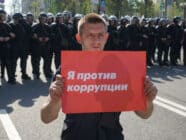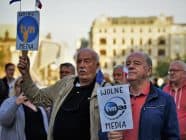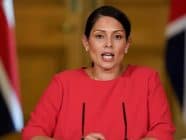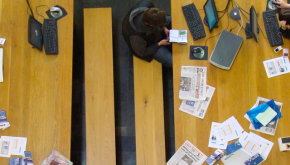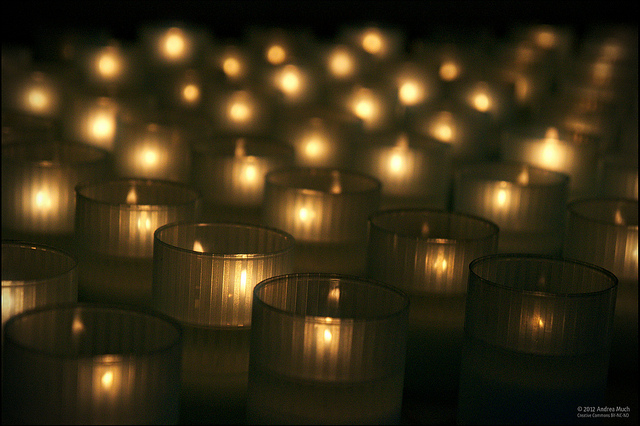 The European Broadcasting Union (EBU) maintains that allowing Azerbaijan to host the 2012 Eurovision Song Contest was good for business and for Azeri citizens.
The European Broadcasting Union (EBU) maintains that allowing Azerbaijan to host the 2012 Eurovision Song Contest was good for business and for Azeri citizens.
More than 100 million viewers worldwide tuned in to watch the 2012 Eurovision finale, a broadcast that effectively closed the curtain on one of the most tumultuous Eurovision competitions in recent memory.
In the lead up to the event, hosted for the first time in the Azerbaijani capital of Baku, newspapers from around the world published countless stories of abused journalists, displaced citizens, and allegations of media suppression.
Radio Free Press reporter Khadija Ismayilova spoke out early against government suppression of the press, after receiving a “letter of warning” in early March 2012 along with video clips of the journalist having sex with her boyfriend in her hotel room.
According to Ismayilova, the extortion attempt came in response to recent press coverage of Azerbaijani President Ilham Aliyev and his family ties to a lucrative construction project in Baku. After Ismayilova publically exposed the extortion attempt, video of the journalist and her boyfriend was quickly posted online.
Soon after Ismayilova’s blackmail attempt, video journalist Idrak Abbasov – who recently received the Index on Censorship 2012 Guardian award for journalism – was hospitalized along with his brother after being attacked by Azeri government officials while filming the demolition of homes in Baku.
As stories similar to Ismayilova’s and Abbasov’s continued to surface in the months leading up to the competition and press coverage of the Eurovision competition intensified, media and rights groups began to criticize the EBU for their lack of action.
In a March interview with the BBC, EBU spokeswomen Michelle Roverelli clarified her organization’s role, stating the EBU’s strength lies in their ability to promote dialogue concerning open media among member states. Roverelli also pointed out that the Eurovision contest is just for fun, a sentiment echoed by Jørgen Franck, Eurovision’s television director, who says “we stand for change for the better and for democratic rights. That’s what we fight for in Europe. But we don’t actively participate in the process, that we leave to others.”
Still, many argue that by allowing Azerbaijan to host, the EBU is sending a message that Azeri officials can reap the benefits of the EBU’s programs without having to adhere to the mores of their fellow broadcasters.
Max Tucker, Amnesty International’s Azerbaijan campaign chief, claims the EBU’s complicity in Azeri government action is allowing abuse of journalists to continue without fear of consequences. “Despite publicly committing to support free expression in Azerbaijan, the EBU has maintained a deathly silence on recent repeated violations of that right,” says Tucker.
In the past, the EBU has endured criticism concerning the effectiveness of their initiatives. Founded in 1950 and comprised of 85 national media outlets in 56 different European countries, members of the EBU are radio and television companies, most of which have public missions.
Chief among the roles of the organization is their duty to aid in technical innovation in order to level the playing field amongst Euro broadcasters. In addition to promoting technological innovation, the EBU must also promote press freedom by training journalists and media outlets to properly navigate the evolving media environment.
The Eurovision contest is one of the EBU’s best tools in motivating nations to adhere to organizational guidelines. The contest, open only to member broadcasters whose transmissions are made available to at least 98 percent of households in their own country, is highly coveted amongst some Eurozone nations. With more than 100 million watching on television, host countries relish the opportunity to tweak their international profiles – not to mention the economic benefits derived from hosting the event, which brings thousands of journalists, media members, and contestants into the country.
A May 2nd conference organized by the EBU in the month before the 2012 competition, attempted to further showcase the organization’s ability to create platforms for discussion. The conference, titled “Pledge for Independent Media and Free Access to Media of Choice,” featured an A-list cast, with representatives from the Council of Europe, the Government of Azerbaijan, several EBU television and radio members, and various human rights and press organizations.
The meeting covered topics such as harassment and intimidation of journalists and free access to media, with the head of the Azeri Department of Social and Political Issues, Ali Hasanov agreeing to investigate claims of journalist harassment in Azerbaijan while also expressing an openness to “changing state legislation to reduce defamation to a civil and not a criminal offense.”
General director of the EBU and conference chair, Ingrid Deltenre, touted the success of the conference saying, “the discussions took place in a very constructive and open atmosphere of mutual respect.”
Unfortunately this was not a sentiment shared by all. Back in Geneva, a letter was drafted and sent to the EBU by a handful of those in attendance at the workshop. The letter expressed a general lack of confidence in the EBU’s ability to hold Azerbaijan accountable for promises made during the conference. The letter also called on the EBU to publically “demand concrete results on press freedom issues from the Azerbaijani authorities.”
In a May 10 interview with Spiegel, general director Deltenre attempted to further clarify the role of her organization, yet failed to show that the EBU has any real ability to initiate change in Azerbaijan. Deltenre told Spiegel that the EBU’s role is to promote the airing of quality and diverse content, yet sanctions of stations are above their means. “When it comes to freedom of expression and freedom of the press, it is often the government and not the station that is the problem,” she explained.
In terms of the Eurovision contest, the EBU sees positive aspects in shining a light on Azerbaijan. Deltenre championed the contest’s ability to raise attention regarding Azerbaijan’s press freedom record as well as the EBU’s role. “The EBU believes that in the long run, continuous work and constant dialogue leads to improvement.” Deltenre also hinted that the strength of the their intervention abilities lies in their capacity to promote discussion, an objective which she claims was reached by the May 2nd meeting.
Now that the bright lights of the Eurovision contest have faded, the EBU will continue to work with Azeri officials to change the culture for journalists. Despite calls for more aggressive action against Azerbaijan, Deltenre maintains that allowing Azerbaijan to host the event was good for the EBU and for European Broadcasting as a whole. “We have the Eurovision Song Contest to thank for the fact that [people] are interested in human rights in Azerbaijan and in the EBU.”
Tags: Azerbaijan, European Broadcasting Union, Eurovision Singing Competition, Media ethics, Press freedom


